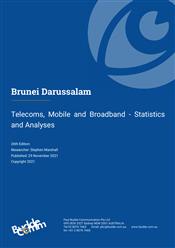Brunei Darussalam Telecoms Market Report
Telecoms, Mobile and Broadband - Statistics and Analyses

Brunei’s fixed-line telecom markets blossom while mobile languishes
Brunei Darussalam seemed poised to start its economic recovery from the double blow it received to its GDP in 2020 from the Covid-19 crisis and a global slump in oil prices. However, expectations may have been dashed by the sudden emergence of the Covid-19 Delta variant in the country in August 2021, which followed months of zero cases. Brunei’s mobile market had already experienced a sharp drop-off in subscriber numbers in 2020, which must have put a serious dent in the overall telecom sector’s revenues. A further prolonged shutdown to try and regain control over the Covid-19 situation can only exacerbate the challenges for the sector, as it looks ahead to a new start in 2022 with more concerted efforts to build out the fixed-line infrastructure while also progressing towards introducing 5G mobile services.
Brunei’s fixed-line market is one of the few countries in the world to have displayed significant growth rather than a decline in teledensity in the last few years. This upward trend is set to continue as the new Unified National Network (UNN) works diligently to expand and enhance the fixed-line infrastructure around the country. Strong growth was also seen in the fixed broadband space, on the back of those same infrastructure developments that are part of the Brunei Vision 2035 initiative. That being said, fixed broadband penetration is starting from a relatively low base by international standards and is still only at 18%, leaving lots of room for growth.
Mobile and mobile broadband, on the other hand, are still suffering from the market contractions first felt in 2020. However, penetration rates for both segments were already extremely high so the decline may simply be a reflection of those users with services that were purely discretionary rather than being an indicator of any broader malaise in the sector.
This report includes the regulator's market data to June 2021, Telecom Maturity Index charts and analyses, assessment of the global impact of Covid-19 on the telecoms sector, and other recent market developments.
Key developments
- Bucking global trends, Brunei increases fixed-line teledensity and fixed broadband penetration while dropping back on mobile and mobile broadband.
- The first of five Proof of Concept 5G projects is unveiled, aiming to increase awareness about the benefits of 5G.
- Brunei’s 2G GSM network is shut down, with the spectrum to be reallocated to 3G, 4G, and potentially 5G use.
- Imagine joins DSTCom and Progresif to become the third operator in Brunei’s mobile market.
- The Unified National Network (UNN) launches a co-location service at its Tier 2 data centre.
- DST launches two new e-commerce solutions: DSTPay and the Zakat Fitrah Online Payment Service.
Companies mentioned in this report
Imagine (Telekom Brunei/TelBru), DST/DSTCom, Progresif (B-Mobile).
Related Reports
- 2019 Asia - Mobile Network Operators and MVNOs
- 2019 Asia - Fixed Broadband Market - Statistics and Analyses
- 2019 Asia - Mobile Infrastructure and Mobile Broadband
- Tajikistan - Telecoms, Mobile and Broadband - Statistics and Analyses
- Maldives - Telecoms, Mobile and Broadband - Statistics and Analyses
- Vietnam - Telecoms, Mobile and Broadband - Statistics and Analyses
- Sri Lanka - Telecoms, Mobile and Broadband - Statistics and Analyses
- Mongolia - Telecoms, Mobile and Broadband - Statistics and Analyses
- Nepal - Telecoms, Mobile and Broadband - Statistics and Analyses
- Armenia - Telecoms, Mobile and Broadband - Statistics and Analyses
Share this Report
TMT Intelligence
A platform to scale your intelligence tasks
Monitor critical insights with our AI-powered Market Intelligence Platform gathering and analyzing intelligence in real time. With AI trained to spot emerging trends and detect new strategic opportunities, our clients use TMT Intelligence to accelerate their growth.
If you want to know more about it, please see:
Research Methodology
BuddeComm's strategic business reports contain a combination of both primary and secondary research statistics, analyses written by our senior analysts supported by a network of experts, industry contacts and researchers from around the world as well as our own scenario forecasts.
For more details, please see:
More than 4,000 customers from 140 countries utilise BuddeComm Research
Are you interested in BuddeComm's Custom Research Service?
Hot Topics
News & Views
Have the latest telecommunications industry news delivered to your inbox by subscribing to BuddeComm's weekly newsletter.